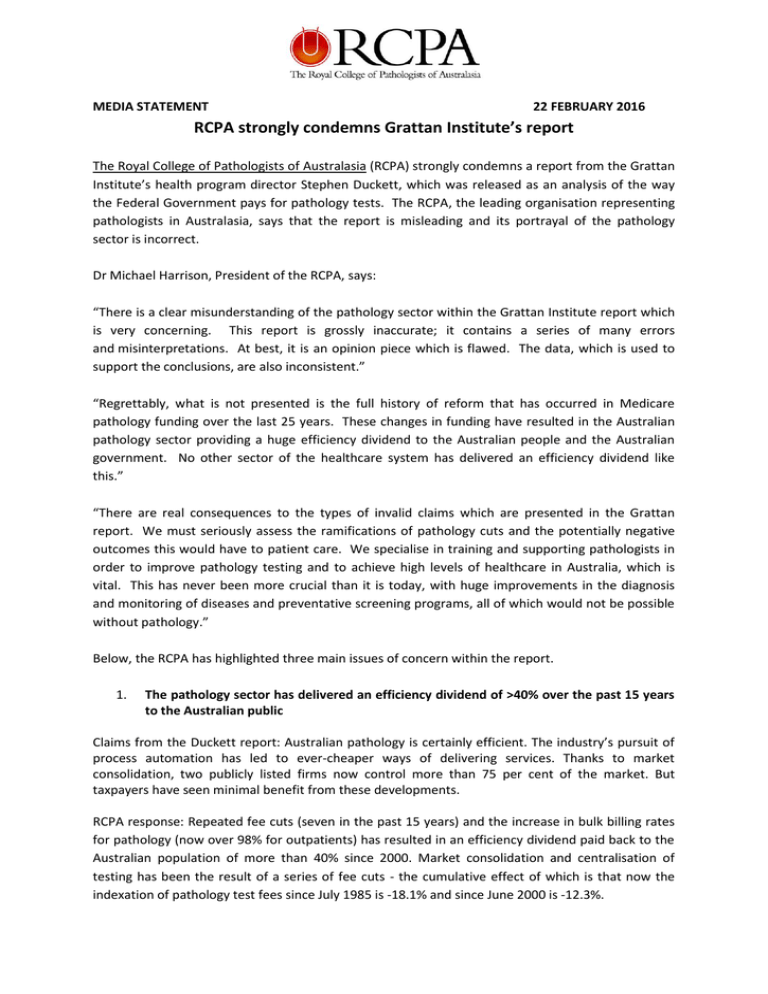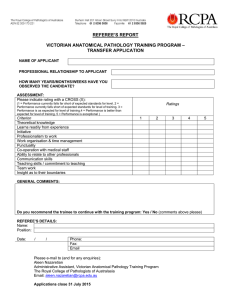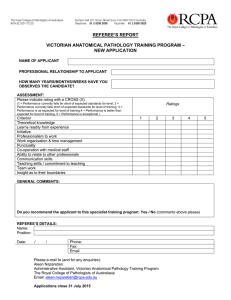RCPA strongly condemns Grattan Institute’s report
advertisement

MEDIA STATEMENT 22 FEBRUARY 2016 RCPA strongly condemns Grattan Institute’s report The Royal College of Pathologists of Australasia (RCPA) strongly condemns a report from the Grattan Institute’s health program director Stephen Duckett, which was released as an analysis of the way the Federal Government pays for pathology tests. The RCPA, the leading organisation representing pathologists in Australasia, says that the report is misleading and its portrayal of the pathology sector is incorrect. Dr Michael Harrison, President of the RCPA, says: “There is a clear misunderstanding of the pathology sector within the Grattan Institute report which is very concerning. This report is grossly inaccurate; it contains a series of many errors and misinterpretations. At best, it is an opinion piece which is flawed. The data, which is used to support the conclusions, are also inconsistent.” “Regrettably, what is not presented is the full history of reform that has occurred in Medicare pathology funding over the last 25 years. These changes in funding have resulted in the Australian pathology sector providing a huge efficiency dividend to the Australian people and the Australian government. No other sector of the healthcare system has delivered an efficiency dividend like this.” “There are real consequences to the types of invalid claims which are presented in the Grattan report. We must seriously assess the ramifications of pathology cuts and the potentially negative outcomes this would have to patient care. We specialise in training and supporting pathologists in order to improve pathology testing and to achieve high levels of healthcare in Australia, which is vital. This has never been more crucial than it is today, with huge improvements in the diagnosis and monitoring of diseases and preventative screening programs, all of which would not be possible without pathology.” Below, the RCPA has highlighted three main issues of concern within the report. 1. The pathology sector has delivered an efficiency dividend of >40% over the past 15 years to the Australian public Claims from the Duckett report: Australian pathology is certainly efficient. The industry’s pursuit of process automation has led to ever-cheaper ways of delivering services. Thanks to market consolidation, two publicly listed firms now control more than 75 per cent of the market. But taxpayers have seen minimal benefit from these developments. RCPA response: Repeated fee cuts (seven in the past 15 years) and the increase in bulk billing rates for pathology (now over 98% for outpatients) has resulted in an efficiency dividend paid back to the Australian population of more than 40% since 2000. Market consolidation and centralisation of testing has been the result of a series of fee cuts - the cumulative effect of which is that now the indexation of pathology test fees since July 1985 is -18.1% and since June 2000 is -12.3%. Claims from the Duckett report: First, the way we pay for pathology can be improved to allow government – and taxpayers – to share in the massive efficiency savings that the industry currently keeps to itself. RCPA response: As explained, an efficiency dividend of over 40% has been paid to Australians for their Medicare pathology since 2000. In contrast, corrected for CPI/AWE, the other areas of Medicare are costing the Australian population 6.2% more than they did in 2000. 2. Cost comparisons are not correct Claims from the Duckett report: In the report, figure 5 shows the prices paid for comparable pathology tests in the United States, New Zealand and Canada compared to Australia’s Medicare out-of-hospital rebate. Although comparing pathology costs across countries is difficult, it appears that prices for comparable pathology tests in Australia are higher than in other countries. RCPA response: The data used here is incorrect as the real price of pathology tests in Australia has to take into account the episode cone and other payment rules. Considering the 70% of pathology that is requested by general practitioners the episode cone impact for complete blood count, for instance, would mean that the actual price to government is $8.70. This is far below any of the other countries compared in figure 5. Similar figures for INR are $11.23, TSH is $18.30, Glycosylated Hb is $6.45 and Ferritin is $9.64. In all cases, the Australian costs are less than at least half the other comparators and, in two cases, complete blood count and glycosylated Hb, the Australian fee is by far the cheapest. Using prices listed in the PST and not adjusted for payment rules such as episode and item coning means that the attempted comparison is not valid. 3. Pathology funding agreements have delivered agreed outcomes, however successive Governments have unilaterally abandoned 2 of the 5 PFAs Claims from the Duckett report: Further, the targets set in the (current) Agreement have not been achieved, with overruns of 1 to 5 per cent each year (see figure 4). The cumulative overrun in the first four years of the current five year Agreement is $357 million. RCPA response: The “current” five year agreement was abandoned by this government in late 2014, less than halfway through its term. In addition, the previous five year agreement was abandoned by the previous government in 2009. All other agreements were managed to an agreed outlay For more information on the RCPA, visit www.rcpa.edu.au or see our updates on Facebook or Twitter - @PathologyRCPA #RCPA #pathology #MedicineIsPathology. ENDS About the Royal College of Pathologists of Australasia: The RCPA is the leading organisation representing pathologists in Australasia. Its mission is to train and support pathologists and to improve the use of pathology testing to achieve better healthcare. Media enquiries: Dr Debra Graves Chief Executive Officer The Royal College of Pathologists of Australasia +61 2 8356 5858 Debrag@rcpa.edu.au Marco Navarria Senior Account Manager S2i Communications +61 2 9262 4766 Marco@s2i.com.au


